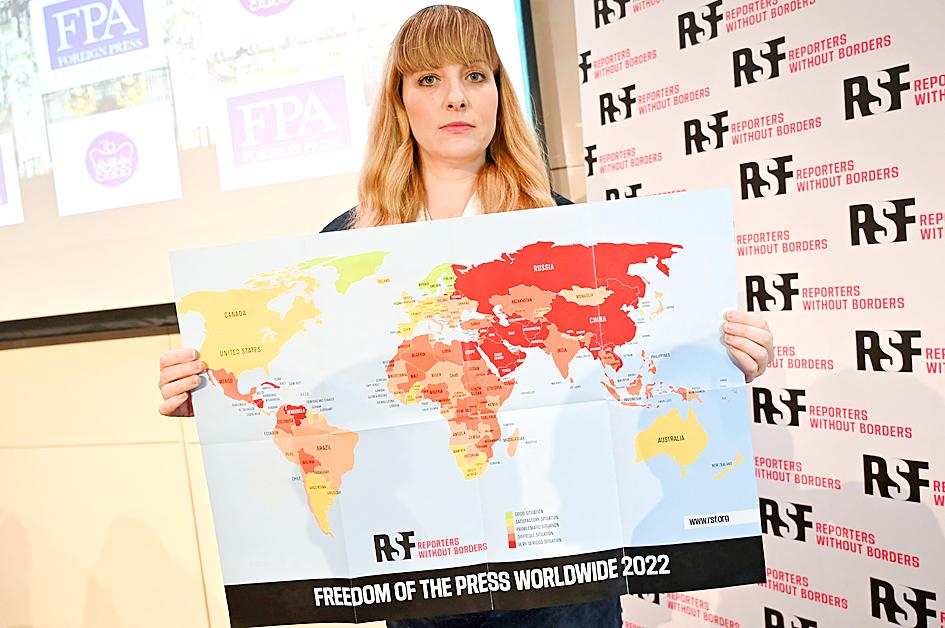Despite Taiwan moving up five places to No. 38 in the World Press Freedom Index released yesterday by Reporters Without Borders (RSF), the organization said more needed to be done to address a “toxic” working environment for journalists.
Taiwan’s ranking placed it fourth in the Asia-Pacific region, behind New Zealand (11th), East Timor (17th) and Bhutan (33rd), but ahead of Australia (39th) and South Korea (43rd).
Taiwan was among the 40 countries listed in the index as having a “satisfactory” media environment.

Photo: AFP
The index’s top three spots went to Norway, Denmark and Sweden in that order, with the three Nordic countries considered to have a “good” media environment.
Commenting on the latest index, Cedric Alviani, head of RSF’s East Asia Bureau, said the change in Taiwan’s ranking did not reflect the nation’s improvement, but was rather the result of a modified way of compiling the index.
“This year, Taiwan moving up five ranks does not reflect any significant improvement in terms of press freedom,” Alviani told the Central News Agency during a telephone interview yesterday. “So the movement is purely due to the new system we used to make the index.”
This change of criteria enabled the index to better reflect the current press freedom situation of every country, Alviani said.
While Taiwan has a favorable ranking, its press freedom situation has been “impaired” by some “serious problems,” he said.
Political polarization and the sensational approach that Taiwanese media take to report certain news pose an “obstacle” to the public getting factual and objective information, Alviani added.
RSF had for the past year repeatedly called on the government to take some measures to address these problems, such as providing serious funding for public broadcasters without compromising their editorial independence, he said.
He also said the working environment for journalists was “quite toxic” and that such a situation continued to impact Taiwan’s press freedom.
Many young journalists have changed jobs after a few years of work because they were underpaid and overworked, and because it was not possible for them to do quality reporting as they had been expected to do, Alviani said, citing RSF’s past interviews and discussions with Taiwanese journalists.
In East Asia, the press freedom situation is “getting worse,” he said.
In particular, the ranking of Hong Kong showed “one of the biggest downfalls ever in our index over the past 20 years,” Alviani said.
Hong Kong ranked 148th in this year’s index, slipping 68 spots from No. 80 in the previous ranking.
“One could be afraid that in a few years, let’s say before the end of the mandate [of the Sino-British Joint Declaration], freedom of the press in Hong Kong would be no better than freedom of the press in the rest of the country,” he said, referring to China, which finished at 175th in the index.

ACTION PLAN: Taiwan would expand procurement from the US and encourage more companies to invest in the US to deepen bilateral cooperation, Lai said The government would not impose reciprocal tariffs in retaliation against US levies, President William Lai (賴清德) said yesterday, as he announced five strategies to address the issue, including pledging to increase Taiwanese companies’ investments in the US. Lai has in the past few days met with administrative and national security officials, as well as representatives from various industries, to explore countermeasures after US President Donald Trump on Wednesday last week announced a 32 percent duty on Taiwanese imports. In a video released yesterday evening, Lai said that Taiwan would not retaliate against the US with higher tariffs and Taiwanese companies’ commitments to

Intelligence agents have recorded 510,000 instances of “controversial information” being spread online by the Chinese Communist Party (CCP) so far this year, the National Security Bureau (NSB) said in a report yesterday, as it warned of artificial intelligence (AI) being employed to generate destabilizing misinformation. The bureau submitted a written report to the Legislative Yuan in preparation for National Security Bureau Director-General Tsai Ming-yen’s (蔡明彥) appearance before the Foreign Affairs and National Defense Committee today. The CCP has been using cognitive warfare to divide Taiwanese society by commenting on controversial issues such as Taiwan Semiconductor Manufacturing Co’s (TSMC, 台積電) investments in the

‘SPECIAL CHANNEL’: Taipei’s most important tasks are to stabilize industries affected by Trump’s trade tariffs and keep negotiations with Washington open, a source said National Security Council Secretary-General Joseph Wu (吳釗燮) arrived in the US for talks with US President Donald Trump’s administration, a source familiar with the matter said on Friday. Wu was leading a delegation for a meeting known as the “special channel,” the Financial Times reported earlier. It marked Trump’s first use of the channel since returning to the White House on Jan. 20. Citing a source familiar with the matter, the Financial Times reported that Minister of Foreign Affairs Lin Chia-lung (林佳龍) was also a part of the delegation. The visit came days after China concluded war games around Taiwan and amid Trump’s

HELPING HAND: The steering committee of the National Stabilization Fund is expected to hold a meeting to discuss how and when to utilize the fund to help buffer the sell-off The TAIEX plunged 2,065.87 points, or 9.7 percent, to close at 19,232.35 yesterday, the highest single-day percentage loss on record, as investors braced for US President Donald Trump’s tariffs after an extended holiday weekend. Amid the pessimistic atmosphere, 945 listed companies led by large-cap stocks — including Taiwan Semiconductor Manufacturing Co (TSMC, 台積電), Hon Hai Precision Industry Co (鴻海精密) and Largan Precision Co (大立光) — fell by the daily maximum of 10 percent at the close, Taiwan Stock Exchange data showed. The number of listed companies ending limit-down set a new record, the exchange said. The TAIEX plunged by daily maxiumu in just